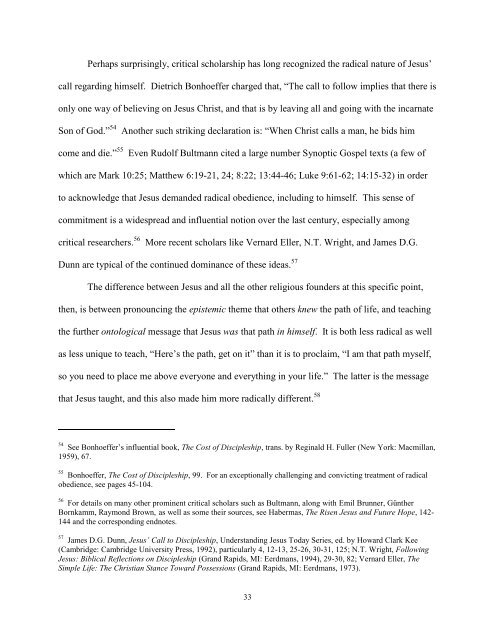Published by
299z7CN
299z7CN
You also want an ePaper? Increase the reach of your titles
YUMPU automatically turns print PDFs into web optimized ePapers that Google loves.
Perhaps surprisingly, critical scholarship has long recognized the radical nature of Jesus’<br />
call regarding himself. Dietrich Bonhoeffer charged that, “The call to follow implies that there is<br />
only one way of believing on Jesus Christ, and that is <strong>by</strong> leaving all and going with the incarnate<br />
Son of God.” 54<br />
Another such striking declaration is: “When Christ calls a man, he bids him<br />
come and die.” 55<br />
Even Rudolf Bultmann cited a large number Synoptic Gospel texts (a few of<br />
which are Mark 10:25; Matthew 6:19-21, 24; 8:22; 13:44-46; Luke 9:61-62; 14:15-32) in order<br />
to acknowledge that Jesus demanded radical obedience, including to himself. This sense of<br />
commitment is a widespread and influential notion over the last century, especially among<br />
critical researchers. 56<br />
More recent scholars like Vernard Eller, N.T. Wright, and James D.G.<br />
Dunn are typical of the continued dominance of these ideas. 57<br />
The difference between Jesus and all the other religious founders at this specific point,<br />
then, is between pronouncing the epistemic theme that others knew the path of life, and teaching<br />
the further ontological message that Jesus was that path in himself. It is both less radical as well<br />
as less unique to teach, “Here’s the path, get on it” than it is to proclaim, “I am that path myself,<br />
so you need to place me above everyone and everything in your life.” The latter is the message<br />
that Jesus taught, and this also made him more radically different. 58<br />
54 See Bonhoeffer’s influential book, The Cost of Discipleship, trans. <strong>by</strong> Reginald H. Fuller (New York: Macmillan,<br />
1959), 67.<br />
55 Bonhoeffer, The Cost of Discipleship, 99. For an exceptionally challenging and convicting treatment of radical<br />
obedience, see pages 45-104.<br />
56 For details on many other prominent critical scholars such as Bultmann, along with Emil Brunner, Günther<br />
Bornkamm, Raymond Brown, as well as some their sources, see Habermas, The Risen Jesus and Future Hope, 142-<br />
144 and the corresponding endnotes.<br />
57 James D.G. Dunn, Jesus’ Call to Discipleship, Understanding Jesus Today Series, ed. <strong>by</strong> Howard Clark Kee<br />
(Cambridge: Cambridge University Press, 1992), particularly 4, 12-13, 25-26, 30-31, 125; N.T. Wright, Following<br />
Jesus: Biblical Reflections on Discipleship (Grand Rapids, MI: Eerdmans, 1994), 29-30, 82; Vernard Eller, The<br />
Simple Life: The Christian Stance Toward Possessions (Grand Rapids, MI: Eerdmans, 1973).<br />
33


